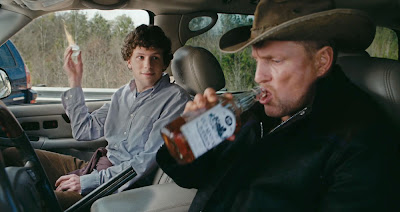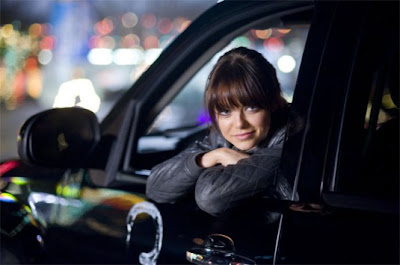The pleasures of massacring zombies: notes on Zombieland

1) I think films like Zombieland appeal to us because modern life has become too cluttered and constrained, too full of words, people, laws, the past, schedules, property, corporations, household appliances, work, commutes, and traffic regulations. Wouldn't it be nice to imagine a 28 Days Later scenario when most fellow humans have been reduced to snarling, drooling infected zombies due to a disease stemming from tainted hamburger? Wouldn't it then be fun to stock up on guns and wander around the car-cluttered freeways, the detritus of old strip malls and grocery stores, and shoot zombies as needed? Aside from the obvious downsides, wouldn't such an apocalypse be tremendously liberating?
Thus does Columbus (Jesse Eisenberg) seem to have fun as he struggles to survive. He lives by a list of rules, which includes:
1) Cardio (needed for running from zombies).
2) Doubletap (one bullet to the head may not suffice. Shoot twice for greater safety).
3) Beware of bathrooms (because you can be relatively defenseless on the john).
4) Seatbelts (in case you need to crash your vehicle to send a zombie through the windshield).
6) Cast iron skillet (one of several weapons including a banjo, a bowling ball, and hedge clippers that work well for zombie killing).
14) Limber up (for battle. Tallahasee (Woody Harrelson) does not think this rule is needed, by the way).
17) Don't be a hero.
31) Check the backseat.
32) Enjoy the little things (such as using one's car door to brain a zombie when driving by).
One day Columbus happens upon Tallahasee on the freeway. They contemplate shooting each other in a Mexican stand-off, but then Columbus sticks out his thumb, and Tallahasee reluctantly agrees to drive him to Columbus, Ohio (characters use place names in this movie to avoid getting too attached to each other). Since there are precious few uninfected humans around, Columbus and Tallahasee can drink whiskey and drive, not wear their seatbelts, let off steam by smashing vans, and hunt for the ever elusive Twinkie (the film's one massive product placement). Tallahasee specializes in zombie killing, but he has no desires for anything aside from a Twinkie--a good thing since there are no female love interests in the plot for him.

Instead, two confidence girls--Wichita (Emma Stone) and 12-year old Little Rock (Abigail Breslin) happen upon our heroes in a grocery store. As they all eventually band together and seek an amusement park out west, I kept being reminded of Breslin's break-out role in Little Miss Sunshine (2006), where she and her highly dysfunctional family seek a junior miss beauty pageant in a yellow VW bus. In Zombieland, the gang also drive a large yellow vehicle--this time a Hummer.
2) While watching the movie, you can enjoy the Van Halen music, the free-for-all pleasures of slaughtering zombies with impunity, and director Ruben Fleisher's slow motion zombie attack action scenes reminiscent of Timur Bekmambetov's work in Wanted (2oo8), but do not look for much plausibility. I found myself wondering about:
b) How can our merry band of zombie killers drive from the Midwest to Los Angeles without being stopped by abandoned cars on the freeway? They seem to make the journey in one night.
c) For that matter, where is the gas for this road trip coming from?



Comments
You focus nicely on why the post-apocalyptic scenario can provide a sense of freedom we can enjoy vicariously. That's why I love movies and novels like this. Many of the novels, like this movie, include a journey across the destroyed land: The Stand, Earth Abides, Eternity Road, The Road. Even though the last one is too grim to afford any positive sides to the situation, the others evoke a sense of enjoyment in the freedom and the hope that society will develop into a simpler way of life unadulterated by the negative sides of technology and development.
Where does all the gas come from? If the electicity is on, you can pump it at a gas station that still has a supply, though I guess you'd have to find a manual way of pumping it if the electicity is off. In the novels above, the characters often siphon it from other cars.
Earth Abides, the classic of this genre, takes the post-apocalyptic era from its beginning (a plague) all the way to the development of a Native American-type culture - way past the point at which gas has run out and canned food supplies have been exhausted or spoiled. In King's The Stand the survivors too conveniently rely on canned food. In The Stand the leavings are grimmer and people resort to cannibalisim. Also, in The Stand the characters rely on bicycles for the cross country trip - no need for gas.
As you can see, I love this genre. I'm fascinated by how people might survive during and after extreme disasters. Despite its silliness, I am looking forward to 2012. (Had to close my eyes through a very lengthy 2012 preview - a new version, from the sounds of it.)
It's a ZOMBIE movie! Lighten up!
(although I thought the exact same thing about the electricity in the end)
I will look into Earth Abides. I read The Road and found that fun too, for some reason. It may not be right, but it cheers me to imagine huge swathes of the human population disappearing.
Thanks, Meredith,
I thought of Shawn of the Dead too, but that film plays more with the conventions of zombie films much like the Scream series did. Zombieland lifts aspects of 27 Days Later without the horror.
Rick,
Good point. I've been reading too much John Simon film criticism recently, and he always considers the plausibility of the film. Perhaps one could say one of the reasons why classic zombie films like Night of the Living Dead hold up well is due to the way they retain a surface plausibility. One could say the rules of Zombieland are plausible, but then the film becomes gradually less so as it shifts west. The amusement park ride element got cloying when Columbus stumbles inside a haunted house ride.
that being said, i really enjoyed this one...just fun!
This is a very good point, as incorrect as it seems on first glance: "Aside from the obvious downsides, wouldn't such an apocalypse be tremendously liberating?" About, gosh, six years ago or so when there was that major black out in parts of the Midwest and Northwest, I was in Ohio on a business trip and experienced that. It wasn't an apocalypse by any means, but it was interesting to watch the world slow down for a bit. People couldn't do all the things they planned on doing, so they just relaxed and took things as they came.
P.S. I was really bothered by the fact that there are 30-some rules but we only get about 10 of them, and all of them repeated twice.
Perhaps the other rules were being saved for the sequel? The lack of further development of those rules didn't bother me. The rules we did learn about often seemed humorously practical for many occasions (such as "cardio"). Rules supply a way to order the chaotic feel at the beginning of the movie. They create discipline amidst the anarchy.
As for the rules: It doesn't bother me that we don't hear all of them. It bugs me that each of the rules we learn about in the beginning conveniently come around the pike a second time, thus giving the sense that there are really only 10 rules and the rest are bullshit. Maybe I'm not making sense.
There are two kind of zombie flicks. One, the kind which is serious apocalypse kind and the other which is the pulp kind and wants you to just sit back and enjoy. This satisfying, enjoyable film belongs to the latter category.
Btw, Bill Murray's is one of the best cameos of the year.